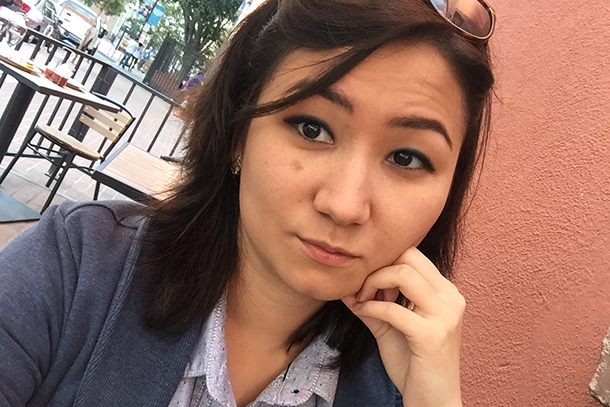What happens to the stem cells in our brains as we age? Albina Ibrayeva, a PhD student from the USC Leonard Davis School of Gerontology who works in the USC Stem Cell laboratory of Michael Bonaguidi, PhD, assistant professor of stem cell biology and regenerative medicine at the Keck School of Medicine of USC, addressed this question in a presentation at the prestigious International Society for Stem Cell Research (ISSCR) Annual Meeting in Boston in June. Ibrayeva talked to HSC News about her recent presentation.
What was the topic of your presentation at the ISSCR’s 2017 annual meeting?
I discussed neural stem cell (NSC) aging. It’s already known that NSC activity diminishes during aging, but we know much less about the cellular and molecular mechanisms underlying this decline in the hippocampus, which is a region of the brain involved in learning and memory. Our lab is using a combination of cutting-edge techniques to identify some of these mechanisms and establish a foundation for understanding how the brain naturally fights against aging — suggesting promising therapeutic avenues for treating age-related neurodegeneration, disease and disorders.
It’s a really exciting time. I was honored and thankful for the opportunity to present my work at a big, international conference like ISSCR.
What inspired you to become a stem cell researcher?
I love science. As an undergraduate student back in Kazakhstan, I constantly sought ways to put my knowledge into practice. During my sophomore year, I interned at the National Center for Biotechnology in Astana, Kazakhstan. This experience enabled me to work with some of the brightest minds dedicated to scientific research in my country and showed me the meaningfulness of a career in biomedical research. Since then, I knew that I wanted to be a scientist.
I won a scholarship and was accepted to graduate school at USC, first to study biomedical engineering as a master’s student, then the biology of aging as a PhD student. In 2015, I joined Michael Bonaguidi’s Lab at the Eli and Edythe Broad Center for Regenerative Medicine and Stem Cell Research at USC. So here I am, excited and really passionate about contributing to a not-so-distant future where research and medicine advance all humans’ well-being.
How do you spend your free time?
In high school, I actually was a professional volleyball player. But then I realized that I don’t want to pursue a career in sports, but science.
Sometimes it is hard to stay active, especially when all day long you are analyzing your data, conducting experiments and running simulations on your computer. But whenever I have free time, I try to spend it being as active as possible. I try to hike at least once a week. The Santa Monica Mountains are the best place to hike, with their breathtaking views of the Pacific Ocean, native California grasslands, famous Malibu beaches and even some historical and cultural sites of Native American life. This is what makes me happy outside of science!
What do you like most about living and working where you do?
USC is one of the world’s top research universities, especially for someone who is studying neuroscience, stem cells and aging. The synergy among the Los Angeles County + USC Medical Center, the Alzheimer Disease Research Center, the Geriatric Study Center, the USC Alzheimer’s Therapeutic Research Institute, the Laboratory of NeuroImaging, the Zilkha Neurogenetic Institute and USC’s stem cell research center provides one of the best avenues to do great research and advance clinical and basic science.
Not only I am blessed to work at USC, but I like the fact that we are surrounded by the best universities, such as Caltech and the University of California campuses in Los Angeles, San Diego, San Francisco and Santa Barbara — with whom we collaborate. California is known to be the most progressive place on planet Earth in science, technology and innovation. That is why I think I am in the right place, where I too can contribute to science and research on aging and its effects.
What is the goal of your future career as a stem cell scientist?
After graduating from the USC PhD program, I would like to work as a professor and researcher at an American university. It is one of my dreams to be able to share my knowledge and being a professor would allow me to do so while continuing my research to benefit U.S. health care and the science of aging.
Research, of course, is and will remain a big part of my life. Science is there to help people who are suffering from different diseases and disorders. In particular, stem cell research has a great potential for its therapeutic application across fields. Science can be really challenging. However, at the same time it is really exciting and I am a firm believer that science is changing and will change the world, if given the chance.
— Cristy Lytal


